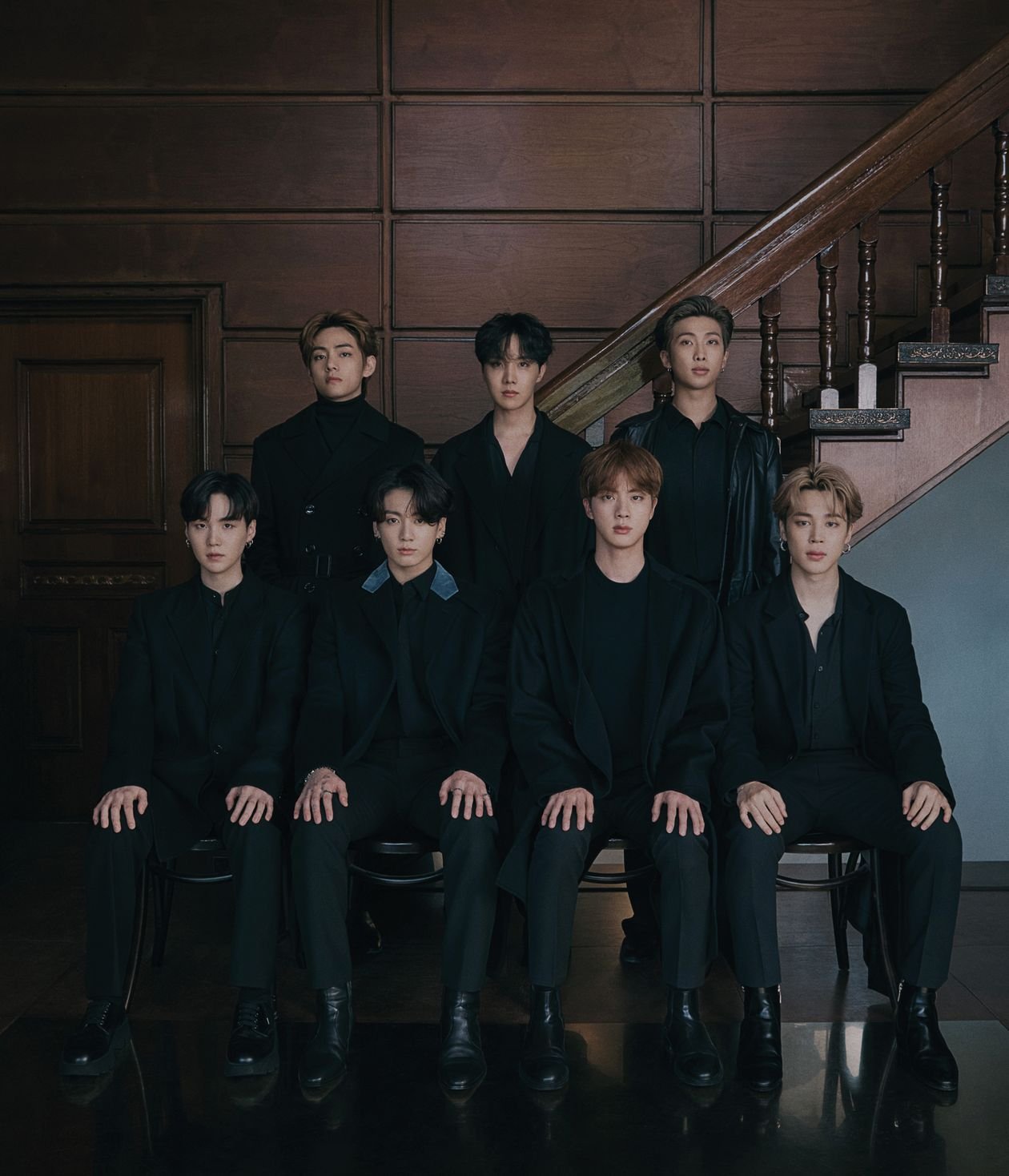The South Korean pop group has reached the top of the U.S. charts, united millions of fans around the world into a self-styled ARMY, shattered online viewing records and been part of a major IPO. Now BTS is preparing to release a new album.
It’s been a really long time since we had a face-to-face interview like this.” Rapper J-Hope, 26, a member of the South Korean group BTS, jumps into conversation while waiting for his bandmates to settle in. The coronavirus pandemic put a hard stop to the group’s world tour, which would have taken them across 17 cities on three continents this year. But it hasn’t made them any less busy as they look ahead to the release of a new album.
 In early September, all seven members of BTS—short for their Korean name Bangtan Sonyeondan, which they alter in English to “Beyond the Scene”—were camped out in Seoul’s artsy Yeonnam neighborhood, just weeks after their latest catchy hit, “Dynamite,” topped global charts and became the most downloaded song of 2020 in the United States. Decked in monochrome outfits, rappers RM, Suga and J-Hope and vocalists Jung Kook, Jin, V and Jimin—as they are known by their stage names—shuttled between interviews and the WSJ. photo shoot inside a house-turned–chic cafe. Clearing security to meet them involved surprisingly little hassle: a name check, temperature screening and Covid-19 health form followed by a short walk to the entrance where security personnel quickly glanced at name tags.
In early September, all seven members of BTS—short for their Korean name Bangtan Sonyeondan, which they alter in English to “Beyond the Scene”—were camped out in Seoul’s artsy Yeonnam neighborhood, just weeks after their latest catchy hit, “Dynamite,” topped global charts and became the most downloaded song of 2020 in the United States. Decked in monochrome outfits, rappers RM, Suga and J-Hope and vocalists Jung Kook, Jin, V and Jimin—as they are known by their stage names—shuttled between interviews and the WSJ. photo shoot inside a house-turned–chic cafe. Clearing security to meet them involved surprisingly little hassle: a name check, temperature screening and Covid-19 health form followed by a short walk to the entrance where security personnel quickly glanced at name tags.
In July, BTS broke the Guinness World Record for staging the biggest virtually attended livestream music performance, which attracted fans from over 100 countries. They miss the real thing, though. “That feeling [of being onstage] is really the best thrill I probably get in life. Even if I leave one day, I think I’ll be back for this,” says Jin, 27, of being onstage in front of BTS’s devoted fans, officially dubbed ARMY. The name stands for “Adorable Representative M.C. for Youth,” though the demographics of the band’s fan base now extend well beyond that age group.
 In part thanks to the ardor of the ARMY—which one count estimates as high as 48 million, based on online commentary by unique authors—the band is often called “the Beatles of the 21st century.” The group has exploded the familiar boy band recipe, taking the concept of fandom into new territory and developing the South Korean genre known as K-pop into a global force. A voluntary census conducted by fans between July and September gathered over 400,000 responses from surveys translated into 46 languages, according to University of Nevada, Las Vegas, graduate student Nicole Santero, who led the effort with two others under the Twitter handle @ResearchBTS. The data, which is still being analyzed, is pointing toward the demographic and geographic diversity of BTS fans.
In part thanks to the ardor of the ARMY—which one count estimates as high as 48 million, based on online commentary by unique authors—the band is often called “the Beatles of the 21st century.” The group has exploded the familiar boy band recipe, taking the concept of fandom into new territory and developing the South Korean genre known as K-pop into a global force. A voluntary census conducted by fans between July and September gathered over 400,000 responses from surveys translated into 46 languages, according to University of Nevada, Las Vegas, graduate student Nicole Santero, who led the effort with two others under the Twitter handle @ResearchBTS. The data, which is still being analyzed, is pointing toward the demographic and geographic diversity of BTS fans.
BTS has topped Billboard’s song chart, released one of America’s bestselling albums of 2020 and performed at the Grammys with Lil Nas X. They sold out London’s Wembley Stadium in 2019, won four MTV Video Music Awards this year and smashed the record for the most views on YouTube in a 24-hour period (over 100 million)—all while singing almost entirely in Korean. They have also collaborated with musical stars such as Ed Sheeran, Sia, Nicki Minaj, Halsey, Charli XCX and Charlie Puth.
 Their impact has extended beyond music. In June, the band donated $1 million to Black Lives Matter, a sum that was matched by fans across the world in just over a day. The group also used its clout to launch Connect, BTS, a public art project showcasing works this spring by the likes of Antony Gormley and Tomás Saraceno in New York, Berlin, London, Buenos Aires and Seoul. In October, the band’s management company, Big Hit Entertainment Co. , went public on the South Korean stock exchange. The company raised about $840 million through its initial public offering with a valuation of about $4 billion, which leapt to $7.6 billion by the end of trading on the first day, October 15, before sliding over the next few days to $5.9 billion. (By way of comparison, in early June, Warner Music’s IPO resulted in a $15 billion valuation, which has since dropped slightly to a $14.36 billion market cap.) Big Hit’s stock debut put the equity holdings of Bang Si-hyuk—the 48-year-old founder and co-CEO of Big Hit and the mastermind behind BTS who owns nearly 35 percent of the business—at a value of around $2.8 billion. BTS is Big Hit’s largest asset, and Bang has given each band member 68,385 of his personal shares, worth over $15 million to each on the day of the IPO. BTS’s global success has powered Big Hit, which is only 15 years old, to revenues high enough to bump one of South Korea’s traditionally entrenched “Big Three” entertainment companies from the top rankings.
Their impact has extended beyond music. In June, the band donated $1 million to Black Lives Matter, a sum that was matched by fans across the world in just over a day. The group also used its clout to launch Connect, BTS, a public art project showcasing works this spring by the likes of Antony Gormley and Tomás Saraceno in New York, Berlin, London, Buenos Aires and Seoul. In October, the band’s management company, Big Hit Entertainment Co. , went public on the South Korean stock exchange. The company raised about $840 million through its initial public offering with a valuation of about $4 billion, which leapt to $7.6 billion by the end of trading on the first day, October 15, before sliding over the next few days to $5.9 billion. (By way of comparison, in early June, Warner Music’s IPO resulted in a $15 billion valuation, which has since dropped slightly to a $14.36 billion market cap.) Big Hit’s stock debut put the equity holdings of Bang Si-hyuk—the 48-year-old founder and co-CEO of Big Hit and the mastermind behind BTS who owns nearly 35 percent of the business—at a value of around $2.8 billion. BTS is Big Hit’s largest asset, and Bang has given each band member 68,385 of his personal shares, worth over $15 million to each on the day of the IPO. BTS’s global success has powered Big Hit, which is only 15 years old, to revenues high enough to bump one of South Korea’s traditionally entrenched “Big Three” entertainment companies from the top rankings.
“These guys have achieved gradual growth by putting their voices into music,” Bang said by email. “BTS’s music that sings of the emotions and experiences of youth first resonated among their peers. Then it resonated among the contemporary global citizens. And that  sentiment transcended borders and reached to the peripheries of the world. That’s how the group got to receive so much love and support. This enables BTS to be connected to their fans wherever they are, and is what makes the seven boys special.”
sentiment transcended borders and reached to the peripheries of the world. That’s how the group got to receive so much love and support. This enables BTS to be connected to their fans wherever they are, and is what makes the seven boys special.”
The latest single, “Dynamite,” is their first group song recorded entirely in English, and their first track to truly break on American Top 40 radio. The track is their first song to get to No. 1 on the Billboard Hot 100. It was quickly followed by their second U.S. chart-topper, a remix of Jason Derulo and Jawsh 685’s TikTok hit “Savage Love (Laxed—Siren Beat).” Their fifth album, BE (Deluxe Edition), is out this month, and the members of BTS say they’re trying to keep their focus on their music. “We’re preparing our next album now, [and I] think it’d be great if all our songs make it into Billboard’s Hot 100,” says Jimin, 25. “Another performance at the Grammys would be great.” A few seats away, Suga, 27, teases, “Just say you’d like to receive the award.”
Who are BTS? And how did they get so famous? The questions have persisted even as the world has become mesmerized by BTS’s irresistible hooks, Technicolor production and high-flying choreography.
Boy bands have long been one of pop music’s most consistent and reliable constructs. Though we now look back at the Beatles fully aware of their world-changing musical and cultural innovations, when they appeared in the early ’60s, more attention was paid to their haircuts than to their songwriting. The Fab Four also established the blueprint of distilling members to one characteristic—The Quiet One or The Cute One—and having fans identify with a favorite.
 These patterns reappeared a few years later with a couple of family groups with ear-candy hooks and elaborate dance moves: the Jackson 5 and the Osmonds. The structure became formalized in the ’80s—enhanced with a sprinkling of light hip-hop—with New Edition (a teen spin on R&B groups with multiple vocalists like the Temptations) and New Kids on the Block, who sold more than 70 million albums worldwide. Puerto Rico–based band Menudo reinforced the genre’s formulaic reputation by replacing members when they reached the age of 16.
These patterns reappeared a few years later with a couple of family groups with ear-candy hooks and elaborate dance moves: the Jackson 5 and the Osmonds. The structure became formalized in the ’80s—enhanced with a sprinkling of light hip-hop—with New Edition (a teen spin on R&B groups with multiple vocalists like the Temptations) and New Kids on the Block, who sold more than 70 million albums worldwide. Puerto Rico–based band Menudo reinforced the genre’s formulaic reputation by replacing members when they reached the age of 16.
Meanwhile, pop music in South Korea was also establishing a lane for groups of singing and dancing teenagers. As far back as 1962, a single released by a Korean girl group called the Kim Sisters even cracked the Top 10 of the U.S. Billboard charts. But contemporary K-pop is generally seen as starting with the ’90s trio Seo Taiji and Boys, who synthesized Korean music and style with gleaming highlights taken from Western pop and were propelled to stardom on a TV talent show. One of the Seo Taiji and Boys members, Yang Hyun-suk, then founded YG Entertainment in 1996; it is now one of Korea’s “Big Three” entertainment companies, and has spawned its own bands, including girl group Blackpink.
In the U.S., boy bands went nuclear at the turn of the century with the notorious manager Lou Pearlman’s Florida pop factory, which assembled both the Backstreet Boys and NSYNC, and dominated the charts for years. Pearlman tried to repeat history with O-Town and LFO, while other groups like 98 Degrees followed a similar model. At the same time, in the Asian music industry, groups such as the Taiwanese band F4 and the Japanese group Arashi were logging huge hits, with g.o.d. setting the pace in South Korea.
 Inevitably, there was a backlash, and then inevitably—because there’s always a new generation of teenagers coming of age—about a decade later, the pendulum swung back. One Direction, constructed by British music producer Simon Cowell in 2010, mixed in some rock and EDM elements to the usual pop confection and became the biggest U.K. phenomenon since the Beatles. (Atypically, they spun off successful solo careers for all five members after the group began its extended hiatus in 2016.)
Inevitably, there was a backlash, and then inevitably—because there’s always a new generation of teenagers coming of age—about a decade later, the pendulum swung back. One Direction, constructed by British music producer Simon Cowell in 2010, mixed in some rock and EDM elements to the usual pop confection and became the biggest U.K. phenomenon since the Beatles. (Atypically, they spun off successful solo careers for all five members after the group began its extended hiatus in 2016.)
In South Korea, though, K-pop continued to become more popular and more formalized, as it became part of an international phenomenon called Hallyu, or “the Korean Wave.” BoA and Wonder Girls were among the acts who attempted to crack the Western market but stalled, while Psy’s 2012 hit “Gangnam Style” was the first YouTube video to reach a billion views. But it still came as a surprise to many when seven Korean guys married the simmering global appeal of K-pop and the resilience of the boy band—amplified by social media—and started storming the charts.
BTS debuted on June 13, 2013, but their first release, “No More Dream’’ (a rap-heavy song that begins with “Hey, what’s your dream?”), hardly made a dent in the K-pop scene, which was dominated by established acts and rising groups such as EXO and Apink at the time. From the start, Big Hit’s Bang was looking to create a hip-hop group that could produce their own songs with messages that would resonate with their audience. In a 2011 lecture at his alma mater, Seoul National University, Bang predicted the coming of “wholesome idols” who could “sing and dance, act for sure and even play instruments and compose.” By then, he was well underway crafting K-pop’s next-generation of superstars.
His first pick was RM (given name Kim Nam-jun, now 26), in 2010. At the time, RM was performing in South Korea’s underground hip-hop scene under the stage name Runch Randa. The next to join, that same year, was Suga (Min Yun-ki), who was performing and producing under the name Gloss, after he placed second in a rap audition organized by Big Hit. J-Hope (Jeong Ho-seok) was part of a dance crew called Neuron before signing on as a Big Hit trainee, as performers in an apprenticeship period with Korean entertainment companies are often called.
 Jung Kook (Jeon Jeong-guk), now 23, joined as a trainee after participating in a local televised singing audition program. He received offers from multiple agencies but chose Big Hit after seeing RM. Jin (Kim Seok-jin) was a college student on his way to school when an official at Big Hit approached him to audition. V (Kim Tae-hyung), 24, was discovered at a closed-door audition held at a dance academy. Jimin (Park Ji-min) was the last to join. He was a dance student at the Busan High School of Arts when he auditioned for Big Hit at the suggestion of his teacher. The members have each carved out strong identities for themselves within the group—J-Hope is considered the star dancer; RM is seen as the main spokesperson, especially in the U.S., as he speaks English; Jung Kook is the “golden maknae” (meaning the youngest in Korean)—but they have all contributed their songwriting and composing skills to hits such as “Boy With Luv,” “On,” “DNA,” “Run” and “Idol.” J-Hope describes his approach as research-heavy. “I first study the topic and think about what story I need to tell and what kind of content it should encompass,” he says. “Sometimes the type of stories I’m dealing with are light, but sometimes they aren’t, so it’s important that I’m knowledgeable about what I’m working on.”
Jung Kook (Jeon Jeong-guk), now 23, joined as a trainee after participating in a local televised singing audition program. He received offers from multiple agencies but chose Big Hit after seeing RM. Jin (Kim Seok-jin) was a college student on his way to school when an official at Big Hit approached him to audition. V (Kim Tae-hyung), 24, was discovered at a closed-door audition held at a dance academy. Jimin (Park Ji-min) was the last to join. He was a dance student at the Busan High School of Arts when he auditioned for Big Hit at the suggestion of his teacher. The members have each carved out strong identities for themselves within the group—J-Hope is considered the star dancer; RM is seen as the main spokesperson, especially in the U.S., as he speaks English; Jung Kook is the “golden maknae” (meaning the youngest in Korean)—but they have all contributed their songwriting and composing skills to hits such as “Boy With Luv,” “On,” “DNA,” “Run” and “Idol.” J-Hope describes his approach as research-heavy. “I first study the topic and think about what story I need to tell and what kind of content it should encompass,” he says. “Sometimes the type of stories I’m dealing with are light, but sometimes they aren’t, so it’s important that I’m knowledgeable about what I’m working on.”
Suga says he comes across ideas for his songs from the books he reads. “I tend to think a lot about the meaning behind words,” he says. “We deal a lot with emotions so I spend a lot of time thinking about how words can be construed differently.”
 RM, who has credits on many of BTS’s biggest songs, will dwell on a line from a movie or a passing scene, sometimes for years, before starting to work it into his lyrics. “[Writing songs] takes a long time for me,” says RM. “So it hurts, body and soul, when I have to throw one away.”
RM, who has credits on many of BTS’s biggest songs, will dwell on a line from a movie or a passing scene, sometimes for years, before starting to work it into his lyrics. “[Writing songs] takes a long time for me,” says RM. “So it hurts, body and soul, when I have to throw one away.”
In recent years, pop music—generally associated with bubblegum, upbeat dance songs—has been getting more serious and introspective. From the Weeknd to Selena Gomez, teen idols have increasingly been writing and singing about mental and emotional health, anxiety and loss. (A 2018 study at the University of California Irvine examined hundreds of thousands of English-language pop songs and confirmed that sadness was on the rise.) Though a casual glance at their intricate choreography may not make it obvious, BTS is celebrated by their fans for touching on psychological and social issues in their songs.
“I don’t like talking about my dark side,” says Jin. “I’m in the camp that believes idols should always show their bright and positive side.” Still, a conversation with Bang inspired Jin’s 2018 solo ballad “Epiphany,” which focuses on self-acceptance. V, who contributed to the neo-soul “Stigma”—which includes lines like “The pain is never soothed”—recently received a phone call from producer Bang on a song he was writing. “Could you tone down this a little?” Bang asked.
“How come he never says things like that to me?” Suga jumps in.
RM responds. “Because that’s (your) personality.”
J-Hope chimes in, laughing, “I’m a bit envious of [Suga’s] expressions.”
“I’m the type that speaks out first, and then thinks about it,” Suga explains.
Pdogg, Big Hit’s chief producer, who has provided musical direction for BTS’s albums from the start, says it’s the band members who decide on the message (like their album title Love Yourself) they want to send through their music. “The most important thing for BTS as a team is the message that members want to convey,” he says. Musically, the band’s initial heavy lean into hip-hop has become fused with genres like Brit rock, EDM and future house over the years.
 The music “still has a footing in hip-hop sound, but when it comes to genre, we’re in the process of expanding the parameters to create a hybrid sound,” said Pdogg in late September, a few days after he had completed production for BTS’s upcoming album. “We’re in the process of perfecting BTS’s unique hue.”
The music “still has a footing in hip-hop sound, but when it comes to genre, we’re in the process of expanding the parameters to create a hybrid sound,” said Pdogg in late September, a few days after he had completed production for BTS’s upcoming album. “We’re in the process of perfecting BTS’s unique hue.”
For their new album, BTS members had made separate bids to feature melodies they had written as the album’s lead song. Jimin describes that process as “painstaking and tearful.” Jung Kook points out that the members weren’t just competing against each other, but against other composers who also submitted attempts to Bang. Jin alone sent him three different melodies. Suga made it to the finals. RM, though, chose to sit this one out. “The competition was too fierce,” he says.
The seven members of BTS spent their childhoods in different parts of South Korea. Jung Kook and Jimin were born in Busan, a southern port city. Jung Kook grew up in a creative household, with an older brother who’s a talented illustrator and parents who like to sing. As a child, Jimin learned kendo (a Japanese martial art using bamboo swords) and thought of becoming a policeman but changed his mind after starting to dance in middle school. His father used to say he should become a prosecutor.
V wanted to be a singer since his childhood, possibly influenced by his father, who had dreamed of becoming a star himself. (“Tae-hyung’s father is super-talented,” Jin says, referring to V by his real name.) Jin grew up in an entrepreneurial household. “My family is all in business, so they’re all good speakers,” he says, and V jumps in to note, “You’ve got your mom’s way with words.”
J-Hope was born in Gwangju and raised by his father, a literature teacher, and a “strong-willed” mother who once ran an internet cafe. “I used to wonder how I could dance,” he says, referring to how no one in his family danced or sang. (“His dad’s quite strict,” Jin adds.) Suga was born in Daegu to a family that he describes as “far from having anything to do with the arts and entertainment,” though his mother picked up drawing in her 60s. As a kid, he thought of becoming a fireman, and at one point his father tried to persuade him to study journalism. He composed his first song when he was 13. He’s since lost the recording but says, “I remember it—I’ll use it one day.”
RM, who once considered studying journalism in college, wrote his first song in 2007. He describes it as a disaster but he held onto it anyway. “I can’t even tell if the lyrics are Korean,” he says.
Social media has overturned the rules of the music industry and elevated the power of the fan, with BTS’s ARMY leading the way. For years, the group has had the most social engagement of any act in the world. Many avid fans take it as their personal responsibility to stream new BTS songs and videos through as many devices as possible as many times as possible, helping to juice the band’s chart positions. The sense of intimacy provided by constant social media contact also leads to an intensity and identification with the BTS members that simply wouldn’t have been imaginable for previous bands. (ARMY is a tightly knit collective. Many fans declare “I’m ARMY,” or “I’m an ARMY,” when describing their devotion to the band.)
“BTS knows how to engage fans between their big video drops with a steady stream of content,” said Lyor Cohen, global head of YouTube Music, by email. When the band released their single “Dynamite” in September, they had also uploaded over a dozen additional clips related to the song, Cohen says, including individual videos of each member singing the song, a reaction video, footage from their choreography rehearsals and a “B-side” clip of their music video showing the band from different camera angles.
The efforts pay off. When “Dynamite” premiered on YouTube, it instantly drew three million viewers, according to Cohen. (At press time in early October, it had nearly 500 million views.) “They are truly a global act with a legion of loyal fans from around the world.” Over 90 percent of BTS clip views this year have come from outside South Korea, including the United States, Mexico, Brazil, Japan and India.
The group has several ongoing video series on YouTube, including Bangtan Bomb (short behind-the-scenes clips), with over 600 episodes and counting, and Episode (longer videos of BTS at photo or music-video shoots). There’s also Run BTS!, a near-weekly entertainment program showing the seven stars involved in games or other activities, which is released on South Korean livestreaming service V Live and on Weverse, Big Hit’s own online platform, which offers exclusive content as well as premium paid memberships. This is in addition to the usual music videos, vlogs, interview clips and reality TV shows in which the band appears.
Randy Suh, a K-pop critic in Canada, says BTS’s success has highlighted the importance and strength of new media in the music industry. From their early days, BTS used to put out three or four clips on YouTube every week and release mixtapes on blogs, she says. “That gave them an approachable image as singers, and it came at a time when people started preferring [social media] influencers who felt closer than some pop singer far away.”
The content empire that BTS produces is so vast that even fans can’t keep up. When “Dynamite” launched, Michelle Tack, 47, a cosmetics stores manager from Chicopee, Massachusetts, requested a day off work to stream the music video on YouTube. “I streamed all day,” Tack says. She made sure to watch other clips on the platform in between her streaming so that her views would count toward the grand total of views. (YouTube says it has systems in place to eliminate videos viewed by computer programs, which can skew the measure of a video’s overall popularity.)
“It feels like I’m part of this family that wants BTS to succeed, and we want to do everything we can do to help them,” says Tack. She says BTS has made her life “more fulfilled” and brought her closer to her two daughters, 12 and 14. The younger one introduced her to the band two years ago.
If feels like I’m part of this family that wants BTS to succeed, and we want to do everything we can do to help them.— Michelle Tack, BTS fan
Fifteen-year-old Abbey Hammond, who lives in Falmouth, Massachusetts, recalls her reaction when she first watched a BTS video in seventh grade. “Their vocals were amazing; they were rapping, dancing, plus they do a lot of acting in the videos—I just thought they were all-around talented, and then looking at the lyrics, they were really meaningful,” says Hammond. The language barrier was never an obstacle. “I don’t think you have to understand what they’re saying to understand what emotions they’re putting out there,” she says. “A lot of it comes from their performance. Words aren’t the only thing you need in order to get them.”
“The best K-pop utilizes storytelling in really innovative ways,” says Colette Balmain, 58, a senior lecturer in film and media and communications at London’s Kingston University, who organized a BTS academic conference in January 2020, at which 200 papers were submitted. She also examines “Bangtan Universe,” an ever-evolving narrative around BTS that is told through multiple mediums, including music videos, online blog posts and social media postings where Big Hit discloses clues or story pieces. The storyline of Bangtan Universe, in which the seven members adopt fictional personas, isn’t revealed in chronological order. Some avid fans take part by writing and changing the stories based on different clues dropped by Big Hit.
“We had albums that have themes in the West, but a story across albums is unusual,” says Balmain. “What Big Hit is doing with BTS is innovating not just the Korean entertainment business, but also the U.S. entertainment business.”
Lee Ji-young, a philosophy professor at Sejong University in Seoul, a self-proclaimed ARMY and author of BTS, Art Revolution, says BTS’s success in the American music industry holds historical significance. “This shouldn’t be seen as just a victory for South Korean singers, but a paradigm shift in America’s racial and linguistic hegemony.”
Lee says BTS’s innovations are also reflected in how ARMY is redefining pop group fan bases. “This is an extremely active community,” she says, pointing to a Twitter account operated by BTS fans to organize charity fundraising projects (@oneinanarmy), free tutoring services within the ARMY community and an academic journal, The Rhizomatic Revolution Review, for which she is an advisory board member. It publishes peer-reviewed papers on “the art, fandom, economic effects and sociocultural forces generated by BTS and ARMY.”
The band, which signed a new seven-year contract with Big Hit in 2018, has other hoops to jump through looking ahead, including starting mandatory military duties for roughly two years by age 28. That means enlisting next year for Jin, 27, the band’s eldest member. Calls for exempting the members from service (a legal option for high-performing athletes and award-winning classical musicians) have been on the rise, though no precedent exists for K-pop stars. So far Big Hit has been silent on the issue.
The stars of BTS say there are still more things yet to achieve. “In the past, we had clear goals and a thirst. We had to do well—we were desperate,” says Jung Kook. “I still have a similar mindset. It’s the achievements we’ve made every step of the way that are prompting me to want to challenge myself more.”
“Before, we were all just fixated on looking for the camera when the red light came on,” says Jimin. “Now we feel more relaxed.” ❐
Courtesy: Wall Street Journal Magazine

























